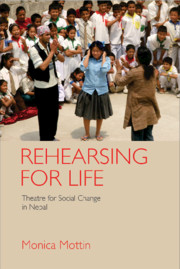Book contents
- Frontmatter
- Dedication
- Contents
- List of Tables, Figures and Boxes
- Acknowledgements
- Chapter 1 Theatre and Life: Theatre at the intersection of art, politics and international development
- Chapter 2 Spacing Out to Speak Up: Resistance, protest and the emergence of street theatre
- Chapter 3 The Streets Become the Stage: Performance, protest and theatre in a time of political crisis
- Chapter 4 Kachahari Natak: Fragments of an aesthetics of theatre for social change
- Chapter 5 Activism not Development Work: Explorations in Tharu kachahari natak
- Chapter 6 A Cultural Army for a Cultural Revolution: Maoist cultural programmes and revolutionary theatre
- Chapter 7 The Ordinariness of the Special: Towards the professionalization of theatre work
- Chapter 8 Conclusions
- Bibliography
- Index
Chapter 5 - Activism not Development Work: Explorations in Tharu kachahari natak
Published online by Cambridge University Press: 05 April 2018
- Frontmatter
- Dedication
- Contents
- List of Tables, Figures and Boxes
- Acknowledgements
- Chapter 1 Theatre and Life: Theatre at the intersection of art, politics and international development
- Chapter 2 Spacing Out to Speak Up: Resistance, protest and the emergence of street theatre
- Chapter 3 The Streets Become the Stage: Performance, protest and theatre in a time of political crisis
- Chapter 4 Kachahari Natak: Fragments of an aesthetics of theatre for social change
- Chapter 5 Activism not Development Work: Explorations in Tharu kachahari natak
- Chapter 6 A Cultural Army for a Cultural Revolution: Maoist cultural programmes and revolutionary theatre
- Chapter 7 The Ordinariness of the Special: Towards the professionalization of theatre work
- Chapter 8 Conclusions
- Bibliography
- Index
Summary
Aarohan and political cultural workers are specialists in their own artistic work, as theatre and political art full-time professionals. Research on how the Kamlari Natak Samuha, one of Aarohan partner groups, used kachahari natak in their social movement provides a comparative view from the grassroots. Before detailing how the Kamlari Natak Samuha worked, I will introduce Aarohan's network across the country. In 2005, Aarohan had 12 partner theatre groups, very diverse in motivations, working conditions, members’ age, type and frequency of performance, and history. Partner groups usually associated with Aarohan because they received training or co-performed in Aarohan's productions: for example, Aarohan members carried out follow-up field visits to some groups that received training in kachahari natak in order to support and advise local members on how to make their theatrical work more effective. Once trained, the groups would obtain project work by themselves through local NGOs or be commissioned street plays to perform as part of the project work secured by Aarohan through international donors. What in my opinion was most important, however, was that local groups could find in Gurukul a meeting and reference point. Very often actors travelling to the capital for their personal occupations stopped in Gurukul to update the group with local news, exchange views with Sunil and the other actors and to share problems and satisfactions. Gurukul had therefore become a place where ‘theatre work’ was considered important, the centre for a community of peers spread all over the country. I will introduce four groups to exemplify their such diversity. The Mithila Natyakala Parishad (MINAP) was one of the oldest theatre groups in Nepal. Established in Janakpur in 1979, the group was a centre for Mithila culture, gathering writers, musicians, and artists. Their actors engaged in both proscenium and street theatre. Shristi Natya Samuha from Dharan started as a proscenium theatre group in 1995. The group then performed kachahari theatre to strengthen the link with their local community, tackling issues like environmental problems, drug addiction, and alcohol, both through NGO projects and out of their own initiative. The group was facing a huge problem: continuity. Its members were mostly young, only three of them had been working for 10 years, and many artists were compelled to quit acting to study or work.
- Type
- Chapter
- Information
- Rehearsing for LifeTheatre for Social Change in Nepal, pp. 158 - 181Publisher: Cambridge University PressPrint publication year: 2017



